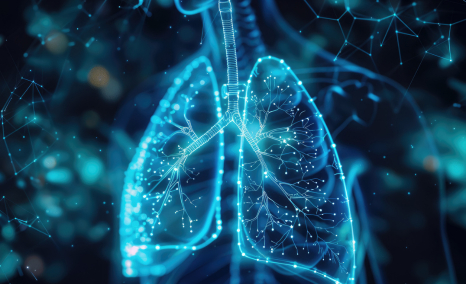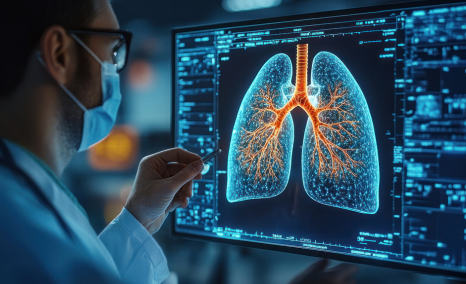Watch Out for the Most Promising Therapies in the Pipeline in ARDS Market
Nov 20, 2024
Table of Contents
Acute respiratory distress syndrome (ARDS) is a rapidly progressing condition that affects critically ill people. The major complication of ARDS is fluid leaking into the lungs, which makes breathing difficult or impossible. Shortness of breath, cough, and fever are among ARDS symptoms; in certain cases, high heart rates and rapid breathing have also been observed. Patients with ARDS may have chest pain, particularly during inhalation, and some may also have blue nails and lips owing to drastically reduced oxygen levels in the blood.
In 2023, the total incident cases of Acute Respiratory Distress Syndrome (ARDS) in the United States were approximately 591,000, representing about 62% of the total ARDS cases across the 7MM (United States, EU4, UK, and Japan). The EU4 countries (Germany, France, Italy, and Spain) and the UK contributed around 34% of the total ARDS cases, while Japan accounted for approximately 4% of the market share.
Downloads
Article in PDF
Recent Articles
- In the fight against COVID-19 – Lilly with Olumiant, Gilead with remdesivir, Rutgers with testing...
- Rising Acute Respiratory Distress Syndrome (ARDS) Prevalence Posing a Major Public Health Concern
- What Factors are Shaping the Trends in the ARDS Market?
- Unmet Needs and Emerging Trends in the Acute Respiratory Distress Syndrome Market Landscape
- Alnylam’s lumasiran results; AZ’s oncology drug; Astellas Roxadustat; Evotec’s partnership with ABL
Acute respiratory distress syndrome is treated with supportive measures such as mechanical ventilation, prevention of stress ulcers and venous thromboembolism, nutritional assistance, and therapy of the underlying damage. Low tidal volume, strong positive end-expiratory pressure, and conservative fluid management may enhance results. Diagnosing and treating any underlying infections with antibiotics that target culture sensitivities is critical. Despite decades of study, ARDS treatment options are limited. The core of management is supportive care with mechanical ventilation. There are few ARDS therapies available in the ARDS market.
Other ARDS treatment options for patients include supplementary oxygen, prone posture, paralytics, fluid management, and a method known as positive end-expiratory pressure (PEEP) to help force fluid out of air sacs. These are used in conjunction with ongoing ARDS treatment of the initial illness or injury.
Because persons with ARDS have a reduced ability to fight infections in their lungs, they may acquire bacterial pneumonia throughout their illness. Antibiotics are used to treat infections. Supportive care, such as intravenous fluids or nourishment, may also be required.
The Food and Drug Administration granted an emergency use authorization (EUA) for the drug Actemra/RoActemra (tocilizumab for the ARDS treatment of hospitalized adults and pediatric patients (2 years of age and older) receiving systemic corticosteroids and requiring supplemental oxygen, non-invasive or invasive mechanical ventilation, or extracorporeal membrane oxygenation) (ECMO). Current ARDS medications are only effective in treating ARDS-related inflammation; none treat reduced lung function.
However, the ARDS market is expected to grow positively due to the factors such as an increase in the incident pool, the anticipated entry of emerging therapies, among others, in the 7MM. The increase in ARDS market size is also a consequence of a rise in awareness and disease understanding.
As per our estimates, the Acute Respiratory Distress Syndrome therapeutic market in the 7MM is projected to grow at a CAGR of 3.6%, driven by increasing disease awareness, improved diagnostics, and the introduction of emerging therapies. In 2023, the market size was estimated at approximately USD 1.6 billion.
Several molecules are being evaluated and investigated by leading pharmaceutical companies such as Biomarck Pharmaceuticals, Athersys, Healios, Direct Biologics, Biohaven Pharmaceutical, Arch Biopartners, APEPTICO Forschung und Entwicklung GmbH, Staidson (Beijing) Biopharmaceuticals, MediciNova, Edesa Biotech, Light Chain Biosciences, Boehringer Ingelheim, Genentech, Windtree Therapeutics, Veru, Mesoblast Limited, Avalo Therapeutics, Pluristem Therapeutics, ILTOO Pharma, and others to strengthen the ARDS pipeline, thereby raising the hope for an efficacious therapy soon.

The expected launch of emerging ARDS therapies, such as EB05 (paridiprubart) by Edesa Biotech and Light Chain Bio, ExoFlo (DB-001) by Direct Biologics, MultiStem (HLCM051) by Healios and Nobel Pharma, GEn 1124 by GEn1E Lifesciences, ALT-100 by Aqualung Therapeutics Corp., STSA 1002 by Staidson (Beijing) Biopharmaceuticals Co., Ltd., TP508 by Chrysalis BioTherapeutics, and others shall further create a positive impact on the ARDS market.
Apart from the molecules mentioned above, EVO-003, Sabizabulin (VERU-111), Invimestrocel, and Ibudilast, among others, are the other pipeline ARDS therapies expected to enter the ARDS market. Moreover, the uptake of potential emerging ARDS therapies with a better clinical profile is expected to be high since no drug is approved. Currently, several assets in the ARDS pipeline are in the late and middle stages of development.
Emering Therapies in the ARDS Market
Drug: EB05
Company: Edesa Biotech/Light Chain Bio
Phase: Phase III
MoA: Toll-like receptor 4 antagonists
Special Designation: Fast track designation (US)
EB05 (paridiprubart) is an experimental monoclonal antibody that Edesa believes could regulate the overactive and dysfunctional immune response associated with ARDS. Specifically, the drug inhibits toll-like receptor 4 (TLR4) signaling which is an important mediator of inflammation responsible for acute lung injury that is activated by SARS-CoV2, SARS-CoV1, and influenza viruses. EB05 has demonstrated safety in two clinical studies (>120 patients) and was able to block LPS-induced (TLR4 agonist) IL-6 release in humans.
In 2023, Edesa and the US FDA agreed on the primary efficacy endpoint for the Phase III trial of paridiprubart in ARDS patients with COVID-19. The drug received fast track designation. In June 2024, BARDA selected it for a government-funded Phase II trial in the US to evaluate its potential in ARDS. A separate Phase III trial of paridiprubart for ARDS due to SARS-CoV-2 is also ongoing in the US and another country.
Drug: ExoFlo (DB-001)
Company: Direct Biologics
Phase: Phase III
MoA: Immunosuppressants; Inflammation mediator modulators; Protein replacements
Special Designation: Regenerative Medicine Advanced Therapy (RMAT) (US)
ExoFlo (DB-001) being developed by Direct Biologics is an extracellular signal product isolated from human bone marrow mesenchymal stem or stromal cells (BM-MSCs) that contains growth factors and extracellular vesicles including exosomes. It provides natural bioactive signals that downregulate inflammation, direct cellular communication, and upregulate tissue repair in humans. In April 2022, the US FDA awarded ExoFlo a Regenerative Medicine Advanced Therapy (RMAT) designation. In July 2022, the company initiated the evaluation of the drug in Phase III for COVID-19 moderate-to-severe ARDS.
In April 2023, the US FDA authorized the expansion pivotal Phase III EXTINGUISH ARDS trial to evaluate the safety and efficacy of ExoFlo in the treatment of moderate-to-severe acute respiratory distress syndrome from any underlying etiology. The drug had favorable safety data and significant efficacy results from its Phase II clinical trial in hospitalized adult COVID-19 patients with moderate-to-severe acute respiratory distress syndrome, and it also reported successful results from its expanded access program in hospitalized COVID-19 patients with moderate-to-severe ARDS.
Drug: MultiStem
Company: Athersys/Healios
Phase: Phase III
MoA: Cell replacements
Special Designation: Fast Track Designation (US), RMAT Designation (US)
MultiStem (HLCM051) is a patented regenerative product designed to enhance tissue repair and healing through various mechanisms, including the production of therapeutic factors in response to inflammation and tissue damage, as well as restoring immune system balance. It is being developed for acute respiratory distress syndrome (ARDS). The US FDA has granted MultiStem Cell Therapy both Fast Track and Regenerative Medicine Advanced Therapy (RMAT) designations for treating ARDS. Additionally, HLCM051 has received orphan drug designation in Japan for the same indication.
Enrollment for a pivotal Phase II/III trial assessing MultiStem cell therapy in COVID-19-induced ARDS patients has been suspended until funding or a partnership is secured. Healios holds the global development rights for ARDS and is preparing for overseas clinical trials, including in the US, to expedite the commercialization of HLCM051 while exploring various partnership and alliance opportunities.
In 2023, Healios reached an agreement with the Pharmaceuticals and Medical Devices Agency (PMDA) in Japan on the trial design needed for data augmentation regarding an additional trial. Healios and Nobel Pharma have also signed a letter of intent for a development and marketing alliance for HLCM051 in Japan.
In February 2024, Healios initiated a Phase III study in Japan involving patients with pneumonia-induced ARDS.
Drug: GEn 1124
Company: GEn1E Lifesciences
Phase: II
MoA: Mitogen-activated protein kinase 14 inhibitors
GEn 1124 is an investigative small molecule drug being developed in collaboration with GEn1E Lifesciences and Biomedical Advanced Research and Development Authority (BARDA), part of the Administration for Strategic Preparedness and Response within the U.S. Department of Health and Human Services to support the development of the company’s novel therapy for acute respiratory distress syndrome (ARDS), The drug candidate is mitogen-activated protein kinase 14 inhibitors . Currently, the drug is in Phase II stage of its development for the treatment of acute respiratory distress syndrome.
Drug: ALT-100
Company: Aqualung Therapeutics Corp.
Phase: II
MoA: Nicotinamide phosphoribosyltransferase inhibitors
ALT-100 is a “First in Man” immune-based monoclonal antibody (mAb) being developed by Aqualung Therapeutics Corp. ALT-100 antibody is a revolutionary, next-generation antibody therapy. The humanized antibody has been developed and optimized by Fusion Antibodies’ revolutionary CDRx humanization and ADD develop ability platforms. This humanized monoclonal antibody will block systemic inflammation and will improve survival in the ARDS. ALT-100 inhibits eNAMPT binding to TLR4. Currently, the drug is in the Phase II stage of clinical trial for the treatment of acute distress respiratory syndrome.
Drug: STSA 1002
Company: Staidson (Beijing) Biopharmaceuticals Co., Ltd
Phase: I/II
MoA: Complement C5a inhibitors
STSA 1002 is an investigative recombinant anti-human C5a IgG1 monoclonal antibody which acts by targeting complement C5a inhibitors C5a by specifically binding to anaphylatoxin C5a, C5a loses its ability to bind to receptors and blocks C5a-induced Biological functions, such as neutrophil chemotaxis, degranulation, and oxygen respiratory burst, etc., while not affecting C5 cleavage and the formation of membrane attack complex (MAC), retaining the bacteriolytic and bactericidal functions of the complement system, thereby achieving the treatment of viruses, etc. Severe pneumonia, acute lung injury, or acute respiratory distress syndrome caused by factors. It is administered through oral and subcutaneous route. Currently, the drug is in the Phase I/II stage of its development for the treatment of acute respiratory distress syndrome.
Drug: TP508
Company: Chrysalis BioTherapeutics
Phase: I
MoA: Angiogenesis inducing agents; Apoptosis inhibitors; Cytokine modulators; Intercellular signalling peptide and protein stimulants; Nitric oxide stimulants; Osteogenesis stimulants; Signal transduction pathway modulators
Chrysalis BioTherapeutics is developing TP508, a 23-amino acid peptide derived from thrombin, to treat ARDS and radiation-induced damage. TP508 promotes tissue repair by activating endothelial cells and stem cells, restoring vascular function, and reducing inflammation. Preclinical data show its potential to mitigate radiation damage and pulmonary inflammation. Supported by NIH and BARDA, TP508 is advancing under the FDA Animal Rule, with potential approval by 2027. It offers a promising approach where previous treatments have failed.
In May 2024, Chrysalis BioTherapeutics was chosen to take part in the 2024 Respiratory Innovation Summit (RIS) during the American Thoracic Society Meeting in San Diego.
The company has obtained FDA IND approval to advance into human clinical trials and has launched a Phase I Safety/PK trial. Following this, additional trials involving ARDS patients will be conducted as funding becomes available.
Future Perspectives in the ARDS Market
The ARDS market is expected to be dominated by high-priced agents such as stem cell therapies and other pipeline candidates with a better clinical profile. Several molecules are being evaluated and investigated by various pharmaceutical companies to strengthen the ARDS pipeline and raise the prospect of effective therapy shortly. The increased ARDS prevalence encourages drug research and development because it is likely to provide an appropriate environment for newer products to be profitable. Because no drug has been approved, demand for potential emerging therapies with a better clinical profile is expected to be high in the ARDS market in the future. Hence, due to all these factors, the ARDS treatment market is expected to witness an upsurge in the coming years.

Downloads
Article in PDF
Recent Articles
- In the fight against COVID-19 – Lilly with Olumiant, Gilead with remdesivir, Rutgers with testing...
- Rising Acute Respiratory Distress Syndrome (ARDS) Prevalence Posing a Major Public Health Concern
- Alnylam’s lumasiran results; AZ’s oncology drug; Astellas Roxadustat; Evotec’s partnership with ABL
- What Factors are Shaping the Trends in the ARDS Market?
- Unmet Needs and Emerging Trends in the Acute Respiratory Distress Syndrome Market Landscape



